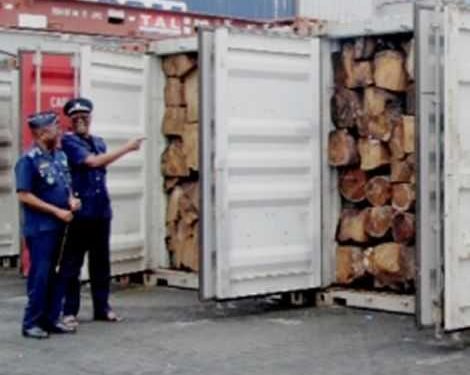Prosper Ahmed Amunquandoh pushed a paper to the manager of the Global Container Terminal (GCT) at the Tema Port, Mr. Kudjoe Wonder Kagbetoh.
“We are here to inspect these containers suspected to contain charcoal meant for illegal export,” he said, an undercurrent of tamed fury and frustration in his voice.
The event seeks to raise awareness on the critical role played by Africa’s oceans and seas in attaining sustainable development within the framework of Agenda 2063 and the 2030 Sustainable Development Goals (SDGs), AU Commission paper made available to the Ghana News Agency in Tema on Thursday stated.
It also provided an opportunity to reflect on opportunities and challenges facing Africa’s resources in its Oceans, Seas, Rivers and Lakes and deliberated on appropriate policy and institutional responses.
Amunquandoh is the inspector-in-charge of renewable energy at the Ghana Energy Commission. He leads a group of officers to enforce the laws and regulations, including clamping down on the illegal export of charcoal.
At his instruction, a terminal hand emerges and trudges over with a giant container seal cutter to confront a seal affixed to the 20-footer container with serial number, SUDU 7934298.
With some practiced force, the worker breaks the seal. The container, with its squeaking metal doors and bars, flings open, displaying the contraband content.
It is not charcoal. It is rosewood. It’s harvesting, transportation, processing, and export have been banned since March 2019.
Several weeks of coordinated surveillance, intelligence gathering has paid off.
Why is rosewood in high demand?
Rosewood has a dark, deep reddish hue, sometimes purple, sometimes cherry. Add this to its strong, sweet smell and that explains the name rosewood. It is the colour and smell that conspired to give it the name.
Rosewood grows in areas where the sun shines all year—the tropics. And that makes Ghana one of the countries where the tree blossoms. No one really cared about harvesting rosewood in Ghana. Like any other locals used it in negligible quantities, for fuel at home.
But everything changed in about 2004, according to a government report.
Rosewood from Ghana hit Chinese shores. And when China, with a population of 1.398billion, develops a taste for anything in the world, the demand literally shores up.
In China, rosewood products are highly coveted and used mainly for aesthetically pleasing ornamental furniture, those reminiscent of the Ming and Qing dynasties of China. The wood is also used for producing musical instruments, and its oil is extracted for its antidepressant, antiseptic, aphrodisiac, and antibacterial properties.
In China, rosewood products are associated with class, wealth, and success. The middle and upper classes cannot have enough of it. A rosewood-carved bed can fetch a cool $1million in plush Shanghai showrooms, according to Times Magazine.
While other tropical hardwood species can go for $1,700 per ton, rosewood can go for $17,000—ten times more. And those in Thailand can fetch up to $50,000 per cubic meter.
With that kind of money at stake, impoverished loggers in Cambodia, Ghana, Zambia, and Thailand are hugely incentivized to destroy ecological areas to feed an insatiable Chinese appetite.
That is how come China has been able to import a total of 3.5million tonnes of rosewood valued at $2.4billion from 2000 to 2013.
That is how, in Ghana, the illegal felling of rosewood trees in places like Tamale, Buipe, Yipala, the Mole National Park, and more than a dozen other forest zones from 2012 to 2019 has seen at least 489,700 rosewoods move from Ghana to mainly China.
That is how in Thailand, the forests have become war zones, with loggers armed with AK-47 rifles and grenades.
When the world rose up to the environmental implication of depleted rosewood, it was finally listed among the Convention on International Trade in Endangered Species of Wild Fauna and Flora (CITES) in 2013.
In Ghana, rosewood grows in dry savannah regions in the north of the country. Northern Ghana is already threatened by desertification that triggered a number of failed tree-planting programmes by the government. The illegal and indiscriminate felling of rosewood, therefore, aggravates the environmental problems in northern Ghana.
Ghana has banned trading in rosewood five times since 2012. The latest ban came on March 11, 2019. But the country remains a prime target for illegal export. With Chinese business cartels lurking around impoverished areas in Ghana, where the supply of money meets a desperate demand for wealth, or rather a desire to get out of poverty.
Tracking trucks, terminals, and Tema
In early June 2021, five trucks emerged on the radar of the Energy Commission’s continuous surveillance and intelligence gathering activities.
The trucks were first noticed in Kumasi, heading for Accra. Their contents moved unchecked at various checkpoints of the Forestry Commission. The Energy Commission had intelligence that the cargo could be charcoal about to be illegally exported through the port. And so, Mr. Amunquandoh and his team kept their eyes on Tema, terminals, and trucks.
By June 17, 2021, one of these containers had finally parked inside the Global Container Terminal (GCT), a large, sprawling space where containers meant for export waited for necessary approval documents from the Customs Divisions of the Ghana Revenue Authority before leaving the country.
Mr. Amunquandoh contacted the Forestry Commission and it assigned Winifred Ohene Wiafe, the Tema District Manager of Forestry Services Division to join him inspect the container, SUDU 7934298.
He needed her because the Forestry Commission checks illegal export of Rosewood while the Energy Commission deals with the illegal export of charcoal. And intelligence had it that smugglers would conceal rosewood deep inside the container and cover it up with bags of charcoal to divert suspicion from authorities.
The two officials from the two-state institutions and a representative of the terminal would, therefore, inspect it together. If the goods were charcoal, the Energy Commission had jurisdiction to determine if it was being illegally exported. If it was Rosewood, the Forestry Commission would take over.
At 12 p.m., on June 17, the two inspectors walked into the terminal. A container of Rosewood was being offloaded brazenly into another container.
A middle-aged man in charge of this offloading was Mohammed Yusif. There were seven others with him. They were two Chinese nationals, at least two Ghanaians, the rest were brawny youths who Mohammed Yusif said were Togolese. They were masterful in arranging the heavy wood neatly into the containers.
According to Mohammed Yusif, he had bought the rosewood from the Forestry Commission, which, he said, had auctioned them after impoundment. But Mrs. Ohene Wiafe cast doubt on Yusif’s account. After examining the wood, she said some of the rosewoods were freshly cut, meaning they had been recently harvested despite the government’s ban.
But Yusif stood by his story and claimed he had re-sold the wood to a Chinese entity. The new owners were packing the goods into a new container. They had contracted Jonada as its shipping agent to export a 20-footer container of rosewood.
While he spoke cajolingly, trying to establish some friendship in an air of suspected illegality, Winifred Ohene Wiafe sent word to the shipping line and to the Forestry Commission, alerting them to trigger processes to detain the container.
Yusif suspected it. The Chinese suspected it. But in that uncomfortable assembly of two state officers and some seven smugglers, no one said it.
But the terminal manager, Kudjoe Wonder Kagbetoh, would not have the team inspect it without following due processes. “Bring an official letter,” he said, explaining that he would need it to show the container owners if they reported a break-in.
The inspection team backed off, promising to be back with the letter. On Tuesday, June 22, 2021, the letter was delivered. Three days later, Amunquandoh came back to the terminal. He was in the company of a Customs officer, A.K Attra. One official from the Forestry Commission was needed to complete the inspections team. They waited for Winifred Ohene Wiafe in vain. She did not show up despite several calls.
Three containers were opened because those were the ones that were found/located by the officials of the Terminal. The Container Numbers of three were UACU3840352, TLLU2598583, and MRKU7980575.
The team did not open the fifth container, TCLU9913631, because it could not be found at the time of the inspection.
Since the containers did not contain charcoal, and there was no official from the Forestry Commission, the Energy Commission reported the matter to the Sector Commander of Customs at the Tema Port, Julius Aweya Kantu.
When the officers were about leaving the terminal, they met a Forestry Commission official who was later identified as Samuel Osei Kofi who was entering the Terminal. He told the Customs officers that the owners of the rosewood may have valid permits. The Customs officers told him to come to the office of the Sector Commander the next Monday, June 28, 2021, and show the permits. If they are genuine, Customs would allow the owners to ship the items, they told him.
On Monday, June 28, 2021, at the Sector Commander’s office, Customs officials and Mr. Amunquandoh waited for the Forestry Commission officer Samuel Osei Kofi to join the team once again for the final search for the fifth suspected container. Interestingly, “Samuel Osei Kofi” didn’t show up on Monday.
The team made calls to find a different Forestry Commission official to join the inspection.
But no one came.
The inspection team went into the terminal again to inspect the final container, TCLU9913631. Busted.
Done and busted! It was rosewood.
After three inspections, five containers of rosewood were found and were seized.
On June 30, 2021, following the media reports, suddenly half a dozen top officials of the Forestry Commission showed up at the terminal. The deputy minister for Lands and Forestry, Benito Owusu Bio, had come to inspect the containers and assure the country that the ministry would investigate the matter, possibly within a month.
On the sidelines, the Forestry Commission’s Chief Executive, John M. Allotey, re-echoed the words of the deputy minister, “We will investigate and get to the bottom of this.”
But during three rounds of inspection, the Forestry Commission showed up at only once.
The Fourth Estate has contacted the Forestry Commission to explain its auction process for rosewood and also steps it has been taking to deal with the harvesting and transporting of rosewood.
But the Commission has declined to speak, referring our reporters to the Lands and Natural Resources Ministry. The Ministry has already indicated, it is investigating the matter.
Who are the agents behind these intended shipments?
On June 2021, 17, a Toyota Highlander with registration number GT 7144-21 pulled up inside the Global Container Terminal (GCT) in Tema Port. Two men climbed out and waited.
This was on the first day when The Fourth Estate reporters had got wind of suspected rosewood loading at the Tema Port and had come to the port to follow the trail of illegality.
It has been close to two months since the Energy Commission went to do the work of the Forestry Commission and tracked down five containers.
It has also been close to two months since the Lands and Natural Resources Ministry vowed to investigate the seizure of these containers.










Discussion about this post